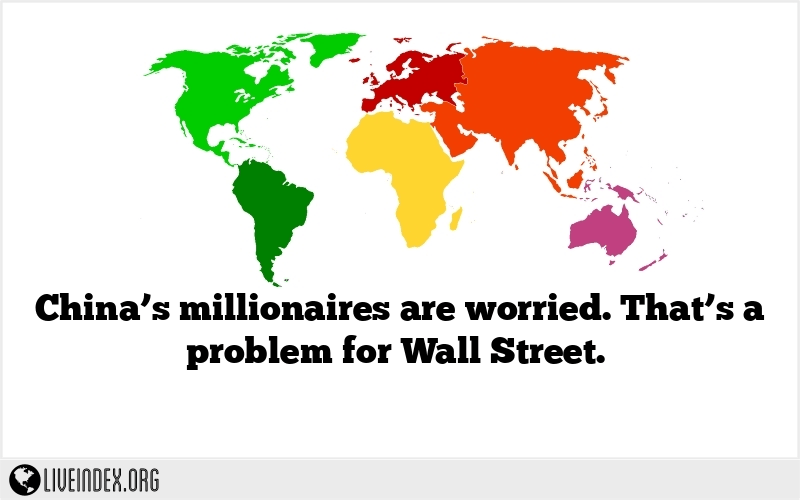China’s millionaires are worried. That’s a problem for Wall Street.

China’s economic slowdown has become a big problem for banks that serve the rich.
For years, banks including Citigroup, JPMorgan and UBS competed hard to win business from China’s giant pool of wealthy people. They hired thousands of relationship managers with the language skills and cultural know-how to gain the trust of mainland China’s moneyed class, and helped them buy shares in Hong Kong, real estate in the U.S. and expensive paintings from European collections.
There was a bonus: Wealthy investors in China had a reputation for taking risks, including using margin loans to buy shares and plowing millions into junk bonds sold by Chinese companies. That gave their banks an extra source of potential profits, since private banks earn fees when their customers trade stocks, bonds or other assets.
But three years of stock-market declines in mainland China and Hong Kong, a wave of bond defaults in the real-estate sector and the faltering performance of China’s economy have dealt a huge blow to the business model of these banks.
China’s wealthy investors are increasingly shying away from risky assets, instead switching their money to deposit accounts or other safe investments.
Some Chinese investors previously saw expected returns of 15%-20% as mediocre and thought proposals of 5% returns might not even be worth their time, said Ken Peng, head of Asia investment strategy at Citi Wealth. “That has changed dramatically,” he said.
Some wealthy Chinese investors used to think a mix of Chinese equities and Chinese junk bonds was a diversified portfolio, said Peng. They are increasingly willing to accept a more truly balanced, medium-risk portfolio, he said.
The sharp rise in U.S. interest rates over the last two years is another headache for private banks, since it means China’s wealthy can now get attractive returns while taking very little risk. A Chinese executive who has an account with a U.S. private bank said he shifted his money into term deposits that could earn him up to 7% a year in interest.
He added that he blocked his relationship manager on social-media app WeChat after the banker messaged him too often, constantly asking him to put more money into his account.
Some private banks have become more flexible with how much money clients need to commit to open accounts. JPMorgan, for example, used to target clients with at least $25 million of liquid assets such as stocks, bonds or cash. The Hong Kong unit of the U.S. bank recently lowered the bar to include clients with $10 million or more, according to people familiar with the matter.
The growth engine stalls
China’s economy has sputtered this year, suffering from a yearslong slowdown in the property market, a slump in manufacturing activity and a decline in exports. Consumer prices have fallen for two months in a row, the latest sign of economic weakness.
Some rich Chinese people have suffered steep drops in their net worth over the past few years, hurt by the real-estate slump and a two-year crackdown on Chinese internet companies, which hit stock-market valuations. Private banks had earned big business from the executives of these tech and property companies.
The decades-long rise of China’s economy created huge opportunities for banks that serve the rich. Last year, there were more than 47,000 ultrawealthy people in China, defined as those with a net worth of more than $30 million, according to Altrata, a research company. That is more than any country apart from the U.S.
China’s ultrawealthy population declined by around 7% last year. That wasn’t unusual: The prolonged impact of Covid-19 hurt the global economy and led to a widespread slump in stock markets. But markets elsewhere have bounced back this year, while China’s benchmark CSI 300 index is down 14% year-to-date and Hong Kong’s Hang Seng Index, which includes the shares of many Chinese companies, has declined 15%.
The market for Chinese junk bonds has virtually collapsed after giant property developers including China Evergrande, Country Garden Holdings and Sunac China defaulted on their bonds.
“The use of leverage in client portfolios has declined dramatically,” said Jessica Cutrera, Hong Kong-based president of independent wealth adviser Leo Wealth, referring to the practice of investors borrowing money from their banks to trade. She said this was due to higher borrowing costs and banks asking investors to provide more collateral when stock prices fall.
In the past, it was normal for private-bank clients in Asia to borrow between 50% and 60% more than their assets, she said. That gave a bonus to banks, since they made money from the loan and the trading fees.
Many of China’s wealthy investors have long had what bankers call a home bias—favoring securities from mainland China and Hong Kong, or businesses they are more familiar with. That has exacerbated the impact of the recent slide in Chinese asset prices on their investment portfolios.
“Many Chinese clients and successful entrepreneurs used to be quite concentrated on some assets, some sectors, sometimes with high leverage,” said Arnaud Tellier, Asia chief of BNP Paribas Wealth Management.
His bank advised its customers to diversify away from China’s property sector three years ago and started to reduce the amount it would lend against these investments. Some of its clients moved related securities to other banks as a result, said Tellier.
Cash is king
Chinese high-net-worth individuals today are putting 28% of their domestic investments in cash products, according to the 2023 China Private Wealth Report by China Merchants Bank and Bain & Company. Between 2020 and 2022, the percentage they held in cash and deposits grew at its highest rate for five years, the survey found.
Some are opting for gold. At a conference last month, Amy Lo, chairman of global wealth management Asia at UBS, said the Swiss bank has set up gold vaults across different locations at the request of clients seeking to hedge geopolitical risks. This isn’t a big earner for banks, according to people familiar with the matter.
In years past, Wall Street firms often won new customers from their investment banking divisions. After helping Chinese companies go public in Hong Kong or the U.S., they would switch to helping those executives grow their personal wealth. It was a convenient route because by listing their companies in Hong Kong, these executives would have also legally moved some of their assets out of mainland China.
But that source of new business is largely off the table for now, after a sharp drop in Hong Kong initial public offerings this year. New listings of Chinese companies have raised just $5 billion in Hong Kong this year, down $5.3 billion in the city this year, down 56% from the comparable period last year, according to Dealogic.
Private bankers think there are still big opportunities in China. There are going to be trillions of dollars of wealth being passed from the first generation to the second in the next decade or two, which requires a lot of planning, said Jackie Mau, head of global private banking at HSBC China.
While many European and American families have passed down their wealth over generations, more than two-thirds of Chinese high-net-worth individuals are entrepreneurs who created and grew their own wealth, he said.
But it isn’t getting any easier. Some global banks have recently tightened their requirements to verify a customer’s source of wealth, the result of growing money-laundering concerns. That is slowing their ability to add Chinese clients, private bankers say.










